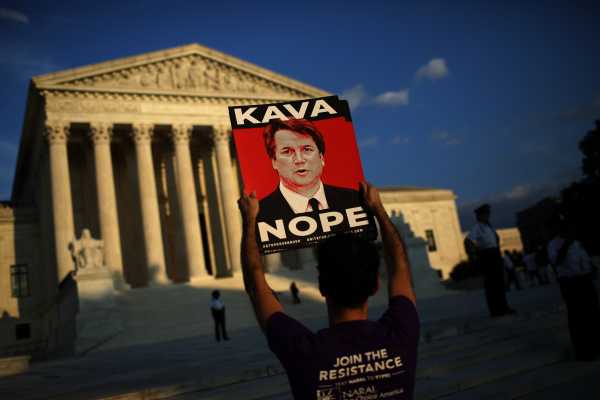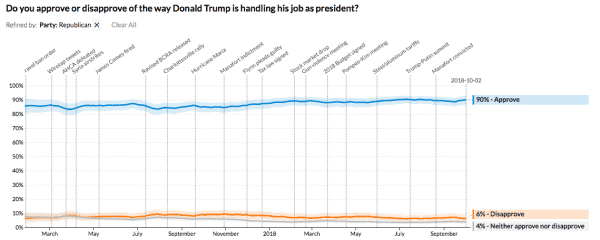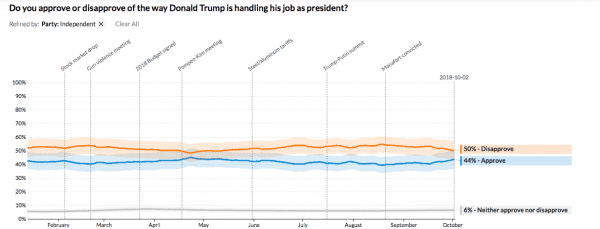
The sexual assault allegations against Supreme Court nominee Brett Kavanaugh have brought out something in conservatives. Even elite Never Trump writers have started lining up to defend the nominee and the president behind him.
“Ever since the rise of Donald Trump, the conservative movement has oriented itself as a circular firing squad. The attacks on Kavanaugh broke that formation,” conservative pundit Seth Mandel writes in the Atlantic. “Mild-mannered anti-Trump conservatives would, in private conversations, fume at Kavanaugh’s treatment and insist Democrats had crossed a line and could not be appeased — the judge had to become a justice.”
Eli Lake, a neoconservative columnist for Bloomberg, put the point more bluntly in a Thursday morning tweet: “Congratulations Democrats. Your Kavanaugh circus has united the right behind Trump.”
On this analysis, Democrats’ investigation into serious and credible allegations of sexual assault — including an accusation that Kavanaugh pinned down a teenage girl, groped her, and held his hand over her mouth to prevent her from crying out — are so partisan that they are rallying even sober Republicans to Trump’s side.
It’s a claim that is, more than anything else, an expression of narcissism. The truth is that Republicans have been united around Trump long before Kavanaugh: The mostly DC and New York-based conservatives who criticize Trump have never really had a constituency in the actual American public. The Kavanaugh hearings may be truly be a turning point in elite conservative thinking, but they are generals in search of an army.
Trumpism was able to seize the commanding heights of the Republican Party easily. What the elites won’t admit is that when push comes to shove, and it becomes a question of Republicans versus Democrats, elite conservatives will hold their noses and side with their team. The Kavanaugh episode proves what we already knew: The conservative opposition to Trump is a sham.
Republicans have always been unified behind Trump
Take a look at this chart, from the polling firm Civiqs, of Trump’s approval rating. It shows Republican approval of the president from the beginning of his presidency, through many of its major controversies, right up until this Tuesday:

Trump has had a approval rating near 90 percent among Republicans for basically his entire presidency. Nothing — not the travel ban, not Charlottesville, not the family separation controversy, nothing — really put a dent in that. Christine Blasey Ford publicly came forward with her allegations of sexual assault against Kavanaugh on September 16; the Civiqs data shows no change.
This isn’t just one pollster. Gallup’s tracking poll has had Trump’s approval rating among Republicans steadily in the 80s for almost his entire presidency; a Pew analysis of its data on Trump describes his approval rating as “remarkably stable” throughout his first 18 months, adding that there was consistently “a wider gap between Republicans’ and Democrats’ views of Trump than for any other U.S. president in the modern era of polling.”
Now, it’s possible that registered Republicans aren’t the right people to poll. It could be that many Never Trump Republicans now identify as independents when contacted by pollsters.
If that were true, then you’d expect to see a significant increase in Trump’s overall approval ratings since the Kavanaugh controversy began, as conservative-leaning independents came home. But there’s limited evidence of that.
Gallup’s polls of independents finds that Trump’s approval rating among independents has gone up by 3 points since the Kavanaugh controversy began, from 34 to 37, but it’s still lower than it was in August (39 percent). Trump’s Gallup numbers have been somewhere in the 30s for much of 2018, sometimes higher and sometimes lower, and there’s little evidence to show that the post-Kavanaugh data is anything outside the norm.
Similarly, the Civiqs numbers suggest a slight shift towards Trump since the Kavanaugh hearings began among independents, but not a major divergence from the overall 2018 numbers. Trump’s -6 net approval rating among independents as of Tuesday (50 disapprove-44 approve) is a bit worse than the -3 number it hit in mid-April (48-45):

So while it is possible that Trump’s handling of the Kavanaugh allegations has indeed helped him gain support from a small percentage of wavering independents, it’s a matter of a few percentage points, at most, among the sub-sample of Americans who identify as independents. And we’ve seen a narrowing at other times as well during 2018; there’s not yet any reason to believe this time is different.
Even if the slight post-Kavanaugh increase is real, the data isn’t good enough for us to know who these independents are. For all we know, these independents aren’t disgruntled center-right conservatives at all, but rather relatively non-ideological men who support Trump’s aggressive pushback against women accusing a high-profile man of sexual assault (polling suggests opinion on Kavanaugh is stratified by gender).
Mandel, in his Atlantic piece, argued that the Kavanaugh allegations are a defining moment in solidifying conservative support for Trump. “In terms of ideological and partisan sorting, no single event in Trump’s presidency has had anything like this impact. And nothing will be quite the same no matter how this ends,” he writes.
The data so far suggests otherwise. There is no wave of Republicans lining up behind the president, nor is there any tangible evidence of conservative independents coming home en masse. If elite Never Trumpers are moving back to the president, then it looks like they’re doing so on their own.
The Never Trumpers are giving themselves permission to side with Trump
Now, there is a credible argument that the Kavanaugh fight is helping the president politically. The Washington Post’s James Hohmann has argued that Kavanaugh is driving up enthusiasm among Republican voters for the midterm elections: GOP supporters who might not have been willing to vote otherwise are getting angry, and are now getting ready to turn out at the polls.
This could be true, though the evidence for it is fairly thin (read FiveThirtyEight’s Nate Silver for the details). If it is, though, the mechanism is not wavering Republicans changing their mind about Trump: It’s people who already support the president, but weren’t really excited to vote, getting really pumped about backing their guy in November. It’s a story not of an ideological shift, but rising enthusiasm among Trump’s base.
This points to the forces really at work here. The Trump-GOP defense of Kavanaugh has largely amounted to a defense of privilege: An increasingly-obvious backlash against the MeToo movement and social change more broadly. It’s best summarized by Trump’s suggestion that he’s more worried about boys being falsely accused than girls actually being assaulted, or Sen. Lindsey Graham’s (R-SC) now-immortal quote from a Senate debate the day after Ford and Kavanaugh’s testimony: “I’m a single white male from South Carolina, and I’m told I should just shut up, but I will not shut up.”
This argument has been paired with a partisan attack on Democrats as somehow being unfair or cruel to Kavanaugh by forwarding these allegations, an argument the nominee made himself in his testimony when he invented a conspiracy to undermine him motivated by pro-Clinton rage.
“This whole two-week effort has been a calculated and orchestrated political hit, fueled with apparent pent-up anger about President Trump and the 2016 election,” Kavanaugh said. “Fear that has been unfairly stoked about my judicial record, revenge on behalf of the Clintons, and millions of dollars in money from outside, left-wing opposition groups.”
“The Trump-era degradation of American conservatism is bringing out my inner liberal”
These twin appeals, backlash politics and partisanship, have formed the core of Trump’s appeal since Day 1. His argument has always been that I will “make America great again” by rolling back social change, and I’ll stick it to the Democrats in the process. This is the argument that seems to be exciting the Republican base — and, crucially, bringing Republicans who claim to be repulsed by Trump into his camp.
Some Never Trumpers, admirably, have seen this for what it is. But in doing so, they have come to see themselves as alienated from not just Trump, but conservatism in general.
“Some defenses of Kavanaugh are bringing out my inner feminist,” Bill Kristol, editor-at-large of the conservative Weekly Standard, tweeted. “The Trump-era degradation of American conservatism is bringing out my inner liberal.”
Most Never Trump conservatives refuse to admit what Kristol has: that the problem isn’t just Trump, but the Republican Party and conservative movement in general. Trump’s regressive social stances and hyper-partisanship are what make him popular in the GOP: If you are to opposed to Trump, then you need to challenge him on that terrain.
But when the choice is put out before Never Trumpers so starkly — either aid and abet Trumpism, or else side with Democrats — they choose the former, time and again. Partnering with the other tribe on something as important as the future of the Supreme Court is unthinkable.
“For the first time since Donald Trump entered the political fray, I find myself grateful that he’s in it,” the New York Times columnist Bret Stephens writes in his Thursday column. “I’m grateful because Trump has not backed down in the face of the slipperiness, hypocrisy and dangerous standard-setting deployed by opponents of Brett Kavanaugh’s nomination to the Supreme Court.”
When supposed Never Trumpers like Stephens write things like this, they are showing you who they really are. Believe them.
Sourse: vox.com






